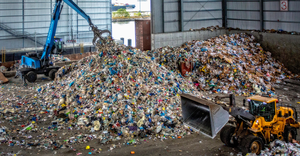Waste Management, Waste Connections Experience Growth in Q2 2018
While both companies saw increases in revenues, they continued to struggle with the impact of China’s waste import ban and contamination standard as well as recycling.
Toronto-based Waste Connections Inc.’s revenues for the second quarter of 2018 were $1.240 billion, up from $1.140 billion in Q1. And Houston-based Waste Management reported $3.74 billion in revenues for the second quarter of 2018, up from $3.51 billion in Q1. While both companies saw increases in revenues, they continued to struggle with the impact of China’s waste import ban and contamination standard as well as recycling.
Here’s a breakdown of the earnings reports for both firms.
Waste Connections Reports Strong Growth; Supports China’s Possible Move to Ban All Imports
Waste Connections’ operating income was $210.7 million, up from $188.7 million in Q1 2018. The operating income included $7.1 million of impairments and other operating items primarily associated with the company’s termination of certain contracts assumed in the Progressive Waste acquisition and $5.6 million in acquisition-related costs.
“Continued strength in solid waste pricing growth, E&P waste activity and acquisition contribution enabled us to exceed our outlook for the period, overcoming increased headwinds from recycling and a weather-delayed ramp in special waste activity across many markets,” said Ronald J. Mittelstaedt, CEO and chairman of Waste Connections, in a statement. “We are especially pleased with our year-to-date adjusted EBITDA margin expansion and adjusted free cash flow generation in spite of these headwinds, as well as our upwardly revised outlook for the full year.”
When questioned about how he feels about China’s possible move to permanently ban imports of recovered fiber and every other form of “solid waste,” Mittelstaedt stated he is supportive of the potential decision.
“Selfishly, I would prefer that China does ban [these materials] permanently and put the final stake in the ground that forces us as an industry—public, private and municipal—to relook at this whole recycling model and create a model that’s sustainable on its own indefinitely,” said Mittelstaedt on a call with investors. “That is how recycling will become a successful business for everyone involved in it. Right now, it’s a broken model, and that’s the industry’s fault because no one else set it up and priced it this way. We as an industry did. It took 30 years to get there, and it will take at least two to three years to get it where we all want it. If China comes back and says the game is back on, everyone will go back to what they’re doing, and we will kick this can down the road … I hope they stand their guns and ban [the materials] permanently. It will cause pain for the industry, but it will fix the problem once and for all.”
Here are some other highlights from the company’s earnings:
“Looking ahead to 2019, we believe we should be well-positioned for above average revenue growth and margin expansion as current favorable trends for solid waste pricing, E&P waste activity and acquisition contribution should continue, while the current recycling headwinds and reported negative volume growth primarily associated with our purposeful shedding of lower quality solid waste revenues, should abate,” said Mittelstaedt in a statement. “Our strong financial profile and free cash flow generation provide us the flexibility to not only invest in new growth projects and fund expected continuing above-average acquisition activity, but to also increase our return of capital to shareholders through double-digit percentage increases in our quarterly dividend each October and opportunistic share repurchases.”
Core price grew 3.8 percent in the U.S. and 4.4 percent in Canada.
Solid waste collection accounted for 68.7 percent of reported revenue ($852.2 million vs. $794.7 million in 2017). Solid waste disposal and transfer accounted for 21.7 percent ($268.9 million vs. $257.2 million 2017). Solid waste recycling ($22.0 million), E&P waste treatment, recover and disposal ($60.2 million) and intermodal and other ($36.4 million) accounted for the remainder.
Prices for OCC in Q2 averaged about $95 per ton, which is down 45 percent from the year ago period and down 8 percent from Q1. Mixed paper revenue declined almost 80 percent YOY.
Net income attributable to Waste Connections in the second quarter of 2018 was $138.7 million, or $0.52 per share on a diluted basis of 264.3 million shares. In the year ago period, the company reported net income attributable to Waste Connections of $123.7 million, or $0.47 per share on a diluted basis of 264.1 million shares.
Adjusted net income attributable to Waste Connections in the second quarter was $172.3 million, or $0.65 per share, versus $145.5 million, or $0.55 per share, in the prior year period.
Adjusted EBITDA was $395.5 million and 31.9 percent of revenue, as compared to adjusted EBITDA of $373.6 million and 31.8 percent of revenue in the prior year period.
The firm also reported YTD adjusted free cash flow of $472.7 million, or 19.9 percent of revenue.
Despite Recycling Headwinds, Waste Management Sees Strong Q2
For the second quarter of 2018, the Waste Management reports revenues were $3.74 billion, compared with $3.68 billion for the same 2017 period. Net income for the quarter was $499 million, or $1.15 per diluted share, compared with $362 million, or $0.81 per diluted share, for the second quarter of 2017. On an as-adjusted basis, excluding certain items, net income was $438 million, or $1.01 per diluted share, in the second quarter of 2018.
“Our traditional solid waste business continued to perform exceptionally well in the second quarter, underpinning our strong financial results,” said Jim Fish, president and CEO of Waste Management, in a statement. “Given the outstanding performance in our traditional solid waste business and a lower than anticipated tax rate, we are increasing our 2018 adjusted earnings per diluted share guidance to a range of $4.05 to $4.10, from $3.97 to $4.05. We also are reaffirming our adjusted operating EBITDA guidance of $4.20 to $4.25 billion and free cash flow guidance of $1.95 to $2.05 billion.”
While the company’s strong performance from its traditional solid waste business is propelling it forward, Fish noted the company continues to struggle with its recycling line of business. During the second quarter, EPS from recycling declined by 7 cents when compared to the second quarter of 2017, largely due to China’s import ban.
“Keep in mind, we believe that more than three-fourths of the impact is behind us,” Fish said in a call with investors. “We expect the headwinds to moderate in the second half of 2018 as we continue to take steps to improve the recycling business. Recycling aside, 2018 is on track to be better than our expectations.”
Here are some key highlights from the company's earnings:
Overall revenue growth was driven by strong yield and volume growth in the company’s collection and disposal business, which contributed $135 million of incremental revenue. This was partially offset by a decline in revenue from the company’s recycling line of business, which fell by $85 million on a year-over-year basis in the second quarter of 2018.
Core price, which consists of price increases net of rollbacks and fees, excluding the company’s fuel surcharge, was 5.3 percent compared to 4.7 percent in the second quarter of 2017.
Internal revenue growth from yield for collection and disposal operations was 2.3 percent versus 1.9 percent in the second quarter of 2017.
Traditional solid waste internal revenue growth from volume was 2.3 percent in the second quarter of 2018. Total internal revenue growth from volume, which includes the company’s recycling and other ancillary businesses, was 1.8 percent in the second quarter.
Average recycling commodity prices at Waste Management facilities were approximately 43 percent lower in the second quarter of 2018 compared to the prior year period. Results for the company’s recycling line of business declined by $0.07 per diluted share when compared to the second quarter of 2017. The full-year impact from recycling is now expected to be a negative $0.17 to $0.20 per diluted share.
As a percentage of revenue, total company operating expenses were 61.9 percent this quarter compared to 62.3 percent the prior year period.
As a percentage of revenue, SG&A expenses were 9.8 percent in the second quarter of 2018 compared to 9.6 percent during the same period last year. Current quarter SG&A costs include $9 million of expense related to litigation accruals, which increased SG&A as a percentage of revenue by 30 basis points and decreased earnings by $0.02 per diluted share.
Operating EBITDA was $1.10 billion for the second quarter. Adjusted Operating EBITDA was $1.06 billion, an increase of $32 million, or 3.1 percent, from the second quarter of 2017. Operating EBITDA in the traditional solid waste business increased 6.9 percent.
Net cash provided by operating activities was $975 million this quarter, an increase of $162 million, or 19.9 percent, when compared to the second quarter of 2017.
Capital expenditures were $436 million, a $137 million increase from the second quarter of 2017, due to acceleration and execution of the company’s fleet strategy as well as investment in its landfills.
“To close, the 2018 story is a good one,” Fish said in the call with investors. “Our solid waste business is in great health, outperforming even our own expectations. At the halfway mark for the year, we are well on our way to meeting or exceeding our operating and financial goals for 2018.”
About the Author(s)
You May Also Like






